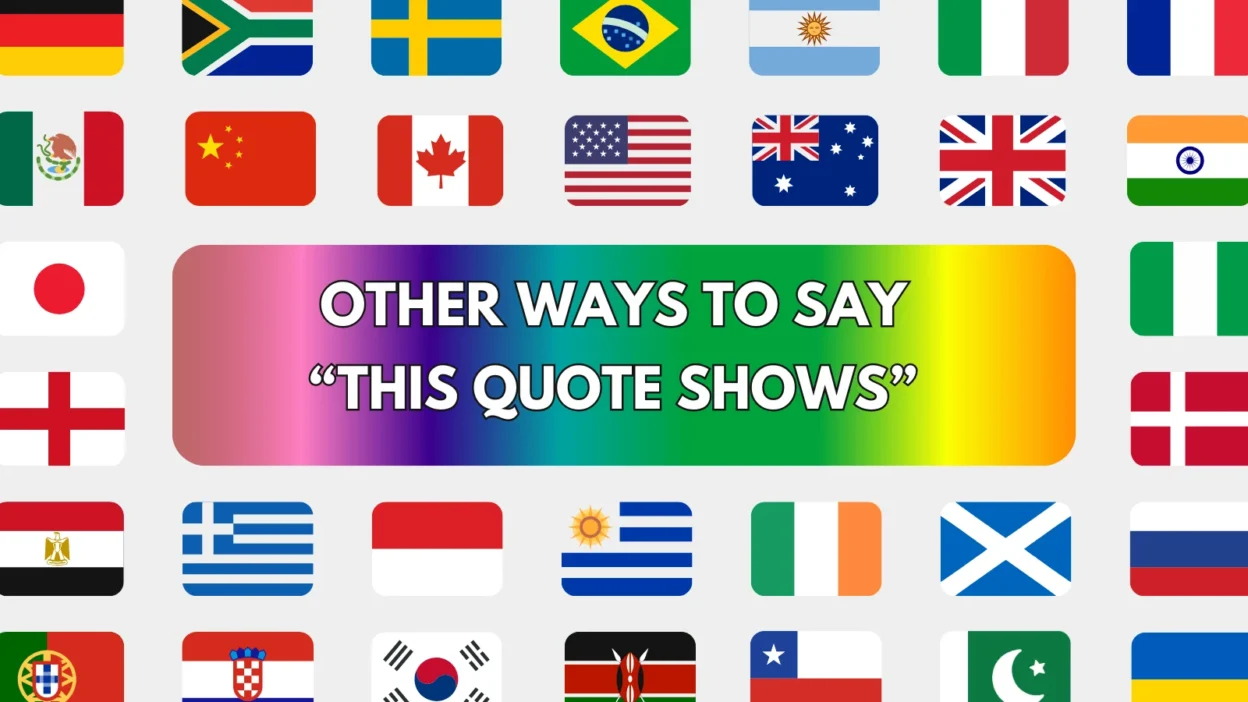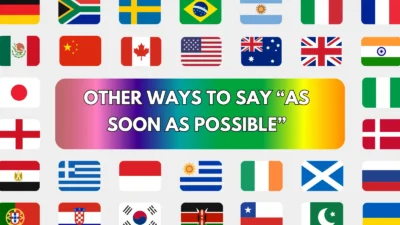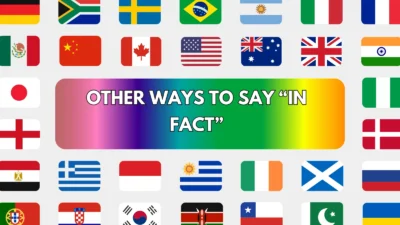The phrase “This quote shows” is commonly used in essays, analysis papers, presentations, and literary reviews to explain the meaning or significance of a quoted passage. However, repeating this phrase too often can make your writing sound dull or repetitive. Whether you’re writing for school, work, or content creation, using fresh and more expressive alternatives can enhance the clarity and sophistication of your message.
Here are 25 strong alternatives to “This quote shows”, each tailored for different tones, purposes, and writing styles.
1. This quote illustrates
Meaning:
Demonstrates or visually represents what is being discussed.
Detailed Explanation:
“Illustrates” is a more vivid and descriptive word than “shows,” perfect for analysis writing where the goal is to clarify a concept.
Scenario Example:
This quote illustrates the main character’s internal conflict.
Best Use:
Academic writing, essays.
Tone:
Analytical, formal.
2. This quote reveals
Meaning:
Uncovers or brings something to light.
Detailed Explanation:
“Reveals” implies that the quote exposes something deeper or previously hidden, such as emotions or motives.
Scenario Example:
This quote reveals the speaker’s true feelings about their past.
Best Use:
Literary analysis, character studies.
Tone:
Thoughtful, introspective.
3. This quote emphasizes
Meaning:
Highlights something as important or central.
Detailed Explanation:
Use this when the quote draws strong attention to an idea, emotion, or theme.
Scenario Example:
This quote emphasizes the importance of resilience in tough times.
Best Use:
Persuasive writing, speeches.
Tone:
Assertive, focused.
4. This quote demonstrates
Meaning:
Clearly shows or proves something.
Detailed Explanation:
A slightly more formal and academic word, suitable for structured writing.
Scenario Example:
This quote demonstrates the author’s use of irony.
Best Use:
Reports, analytical essays.
Tone:
Clear, formal.
5. This quote highlights
Meaning:
Draws attention to a particular point.
Detailed Explanation:
Perfect for discussing key themes, messages, or takeaways from a quote.
Scenario Example:
This quote highlights the tension between tradition and change.
Best Use:
Blog posts, academic work.
Tone:
Insightful, clean.
6. This quote signifies
Meaning:
Stands for or represents something symbolically.
Detailed Explanation:
“Signifies” is great for deeper interpretation, particularly with metaphorical or symbolic content.
Scenario Example:
This quote signifies the beginning of the hero’s transformation.
Best Use:
Symbolic analysis, literature.
Tone:
Sophisticated, reflective.
7. This quote suggests
Meaning:
Implies or hints at something.
Detailed Explanation:
Good when the quote indirectly points to an idea or emotion.
Scenario Example:
This quote suggests that the character is not entirely honest.
Best Use:
Literary essays, character studies.
Tone:
Subtle, interpretive.
8. This quote conveys
Meaning:
Communicates or expresses an idea or feeling.
Detailed Explanation:
Use this when the quote delivers a clear message or emotion.
Scenario Example:
This quote conveys a deep sense of loss and longing.
Best Use:
Poetry analysis, emotional tone studies.
Tone:
Emotive, expressive.
9. This quote reflects
Meaning:
Shows or mirrors a broader idea or truth.
Detailed Explanation:
Use this when the quote echoes a theme, value, or perspective.
Scenario Example:
This quote reflects society’s obsession with perfection.
Best Use:
Cultural analysis, social commentary.
Tone:
Philosophical, thematic.
10. This quote proves
Meaning:
Gives evidence that something is true.
Detailed Explanation:
Strong word used when the quote backs up an argument or claim.
Scenario Example:
This quote proves the author’s position on inequality.
Best Use:
Debates, persuasive essays.
Tone:
Assertive, confident.
11. This quote supports the idea
Meaning:
Backs up or strengthens a viewpoint.
Detailed Explanation:
Used to introduce a quote that reinforces your argument.
Scenario Example:
This quote supports the idea that failure is a key step toward success.
Best Use:
Argumentative writing, business presentations.
Tone:
Logical, structured.
12. This quote underlines
Meaning:
Stresses or underscores an important point.
Detailed Explanation:
Great for reinforcing the importance of a message or value.
Scenario Example:
This quote underlines the urgency of climate action.
Best Use:
Activism, persuasive writing.
Tone:
Emphatic, passionate.
13. This quote exemplifies
Meaning:
Acts as a perfect example of something.
Detailed Explanation:
Used when a quote strongly represents the concept you’re explaining.
Scenario Example:
This quote exemplifies her growth as a leader.
Best Use:
Reports, essays, speeches.
Tone:
Clear, strong.
14. This quote conveys the message
Meaning:
Communicates a specific message or lesson.
Detailed Explanation:
Works well in summaries or conclusions.
Scenario Example:
This quote conveys the message that kindness can change lives.
Best Use:
Reflections, motivational writing.
Tone:
Inspiring, sincere.
15. This quote shows us that
Meaning:
Tells the reader a takeaway or insight.
Detailed Explanation:
Adds a more personal tone while remaining analytical.
Scenario Example:
This quote shows us that courage often comes with sacrifice.
Best Use:
Classroom essays, speeches.
Tone:
Relatable, educational.
16. This quote implies
Meaning:
Hints at or indirectly suggests something.
Detailed Explanation:
Useful for quotes with subtle or layered meanings.
Scenario Example:
This quote implies that the character’s silence is intentional.
Best Use:
Critical analysis, deeper interpretations.
Tone:
Nuanced, intellectual.
17. This quote mirrors
Meaning:
Reflects or parallels another idea or event.
Detailed Explanation:
Perfect when the quote echoes a theme or behavior seen elsewhere.
Scenario Example:
This quote mirrors the earlier scene where trust was broken.
Best Use:
Comparative essays, literary analysis.
Tone:
Poetic, thoughtful.
18. This quote points to
Meaning:
Directs attention toward a conclusion or idea.
Detailed Explanation:
A great neutral option for casual and academic writing.
Scenario Example:
This quote points to the root cause of the conflict.
Best Use:
Case studies, discussions.
Tone:
Neutral, informative.
19. This quote outlines
Meaning:
Gives the structure or core idea of something.
Detailed Explanation:
Use when the quote offers a general overview or framework.
Scenario Example:
This quote outlines the company’s mission clearly.
Best Use:
Business, presentations.
Tone:
Professional, straightforward.
20. This quote identifies
Meaning:
Names or clarifies something specific.
Detailed Explanation:
Helps pinpoint an idea, problem, or trait.
Scenario Example:
This quote identifies the main challenge faced by the protagonist.
Best Use:
Reports, reviews.
Tone:
Analytical, clear.
21. This quote exposes
Meaning:
Brings attention to something hidden or problematic.
Detailed Explanation:
Often used in critique or analysis to show uncomfortable truths.
Scenario Example:
This quote exposes the bias in the system.
Best Use:
Critical writing, journalism.
Tone:
Revealing, bold.
22. This quote portrays
Meaning:
Presents or depicts something clearly.
Detailed Explanation:
Good for describing tone, character, or visual imagery.
Scenario Example:
This quote portrays the character’s loneliness through subtle cues.
Best Use:
Descriptive writing, reviews.
Tone:
Visual, expressive.
23. This quote echoes
Meaning:
Repeats or resonates with another idea or statement.
Detailed Explanation:
Perfect for connecting themes across a text.
Scenario Example:
This quote echoes the opening scene’s message about hope.
Best Use:
Comparative essays, storytelling.
Tone:
Literary, smooth.
24. This quote draws attention to
Meaning:
Forces the reader to notice a specific detail or issue.
Detailed Explanation:
Great for identifying something easily missed or subtle.
Scenario Example:
This quote draws attention to the power imbalance in the relationship.
Best Use:
Essays, critiques.
Tone:
Focused, serious.
25. This quote brings out
Meaning:
Highlights or exposes a characteristic or meaning.
Detailed Explanation:
Useful when a quote reveals emotions, tone, or contrast.
Scenario Example:
This quote brings out the emotional weight of the decision.
Best Use:
Literature, film reviews.
Tone:
Expressive, reflective.
Conclusion
Using alternatives to “This quote shows” keeps your writing vibrant, dynamic, and professional. Whether you’re crafting an essay, preparing a speech, or analyzing literature, these 25 expressions allow you to explain quotes in smarter and more compelling ways. Switch them up depending on the tone, purpose, or audience — and your work will always sound sharp.

Naz Fatima is an author at Saypadia who specializes in writing clear, relatable, and reader-friendly content about language, expressions, and modern terminology. She enjoys breaking down meanings with real-life context so readers can quickly understand and apply them. Naz’s work reflects a strong commitment to clarity, accuracy, and helping users find quick answers without confusion.




